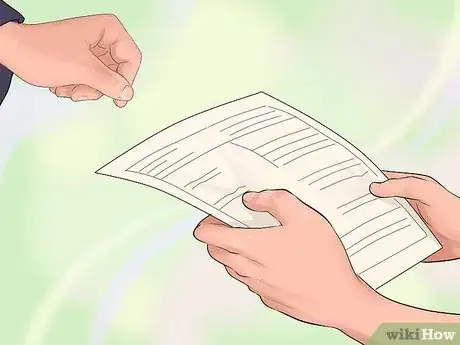This article was co-authored by Clinton M. Sandvick, JD, PhD. Clinton M. Sandvick worked as a civil litigator in California for over 7 years. He received his JD from the University of Wisconsin-Madison in 1998 and his PhD in American History from the University of Oregon in 2013.
There are 12 references cited in this article, which can be found at the bottom of the page.
This article has been viewed 11,981 times.
Rent increases are never appreciated. Landlords often fear losing good tenants, and tenants often worry about whether they can afford the increase in their rent. If you have a dispute about a rent increase, then you should try to find a resolution instead of ending the tenancy. For example, you can try to negotiate with the landlord, either informally or using mediation. However, if a rent increase is illegal under the law, then you should report it to the appropriate authority.
Steps
Objecting to the Increase
-
1Receive your notice. As a tenant, you should be notified of any rent increase in writing. If you have an oral agreement to a month-by-month tenancy, then you might receive only an oral notice. However, if you have a written lease, then your landlord should send you a written notification.
- Landlords increase rent for a variety of reasons. For example, the city might have increased property taxes, or the building might be so old that it needs extensive repairs.
- Also, there are more people looking to rent an apartment than own a house. Mortgage lending standards have tightened over the past few years, and you people in particular need to rent because they can’t buy a home.[1] When there are more renters than apartments on the market, the rent will increase.
-
2Read your state and local law. Although most states allow landlords to raise the rent any amount they choose, state law typically regulates how and when the landlord can raise the rent. For example, if you have a written lease, then the landlord cannot raise the rent until the lease term ends. However, if you rent on a month-to-month basis, then your landlord can typically raise the rent by giving you 30 days’ notice.[2]
- Your city may also have “rent control.” This means that the city limits how much your rent can increase in a year. For example, in San Francisco, most landlords can only raise rent 1.9% from March 2015 to February 2016 and only 1.6% from March 2016 to February 2017. There are usually limited exceptions, but they must be approved by the city’s Rent Board.
Advertisement -
3Consider paying the increase. You might be better off simply accepting the rent increase and not objecting. For example, you might want to accept the increase in the following situations:
- The landlord has grounds for evicting you. For example, you might have been regularly late with rent or have broken some other term of your lease. In this situation, the rent increase might be your only way to stay in the apartment.[3]
- You can afford the increase. It costs money to move. In particular, you will have to pay a security deposit on a second apartment, often before you get the security deposit from your current apartment returned. You might also have to pay for movers and to have your credit report pulled.
-
4Contact your landlord. You should call your landlord and ask why the rent has increased. Write down the landlord’s answer. You might also want to send an email or letter summarizing your conversation.
- If your landlord is violating the law, then gently remind him of the fact. For example, you could say, “I know my apartment is covered by the rent control law. Isn’t the maximum increase this year 1.6 percent?”
- If the landlord didn’t provide proper notice of the increase, then say, “I thought you had to give me the notice 60 days before the start of the new lease? I only received it last week.”
- Always hold onto your communications with your landlord.[4] If you need to sue your landlord at a later date, then you can submit the written communications as evidence.
-
5Remain calm. You may feel angry, especially if you can’t afford the increase in rent. However, there is no reason to damage your relationship with your landlord. Your landlord might not be happy having to increase the rent. Instead, he might feel like he has no choice. If the city cranks up property taxes to cover its debts, then those costs get passed onto tenants.
- By remaining professional, you can assure that you will get a good reference for the next apartment that you rent. Landlords frequently call your prior landlords to ask what kind of a tenant you were. You don’t want to burn any bridges on your way out of your current living situation.
-
6Offer to pay a smaller increase. Your landlord might be willing to negotiate a rent increase, especially if he or she did not give proper notice. You should explain how much you can pay and why.
- For example, you could say, “I really like it here but I think a $15 increase is fairer than a $30 increase.”
- You can also tell the landlord why the rent increase is too high. “My daughter is getting braces, which I wasn’t expecting would be so expensive. I’d really hate to move, but I don’t think I can pay $50 more a month. Maybe $20?”
- Also make sure to highlight any strengths you have as a tenant. For example, you might never have been late with the rent. You should highlight that fact.
Mediating the Dispute
-
1Propose mediation. Either the tenant or landlord can propose mediation. In mediation, both parties meet with a mediator, who is a neutral third party. The mediator listens to your dispute and then helps guide both parties to a solution that each can accept.
- If you liked your tenant, then you should consider mediation. The expense and time necessary to find new tenants might make holding onto your current tenant worthwhile.
- Similarly, tenants should consider mediation if they want to avoid moving. You should also consider mediation if you have found your landlord decent and helpful.[5] If you think the landlord is a bully, then you might just need to move.
- You shouldn’t mediate if the landlord is trying to push through an illegal rent increase. If you live in a city with rent control, then check to see if the proposed rent increase violates the law. If it does, then you should report the illegal rent increase to the appropriate Rent Board.
- You also shouldn’t agree to mediation unless you are prepared to give something up. Mediation is a form of negotiation. The mediator is not a judge and will not decide who is “right” and who is “wrong,” so you won’t win at mediation.[6] Instead, you will try to come to an agreement with the other side about the rent increase. Typically, this means trying to meet the other person halfway.
-
2Find a mediator. Many people offer mediation services, though there is no one central place to look to find a mediator. Instead, you should look in the following places:[7]
- your telephone book under “mediation” or “dispute resolution”
- your courthouse, which might have a list of mediators
- your town or county manager’s office
- your state or local bar association
- online listings at the American Arbitration Association or another website
-
3Attend mediation. You might meet at the mediator’s office or at another neutral location. The mediator should begin by laying out the ground rules and then asking each side to make an opening statement.
- No record is made of the mediation proceedings.[8] You should feel comfortable expressing yourself.
-
4Let the other party vent. During mediation, the other party might start venting and bring up a list of grievances having little to do with the rent increase. As hard as it is to listen, you need to bite your tongue and let the person vent.[9]
- For one thing, mediation is more successful if each side feels that its concerns have been heard. If you immediately object to what the other person is saying, then the other person might shut down and not want to negotiate anymore.
- Also, the other person might need to just blow off some steam. After doing so, he or she might be in a better mood to meet you half way.
-
5Repeat what the other person said. Before telling the mediator your own opinion, you should briefly summarize what the other side just said. Be sure to summarize accurately.[10] If you twist and turn someone’s words, then you should expect them to get angry.
- Let the mediator know how you see the dispute. Give your reasons for why you are asking for a rent increase or why you can’t afford it.
- Avoid personal attacks. For example, you shouldn’t call the landlord a greedy slum lord, and you shouldn’t call a tenant lazy or cheap.
-
6Find common ground. As you discuss your disagreement with the mediator, you might find out that a compromise is available. For example, your landlord might agree to reduce the amount of the rent increase if you promise to not be late on rent payments. You could also agree that if you are late on one payment, then your rent will immediately be increased.
- The mediator is skilled at helping people find creative solutions to their disagreements. The key is to keep an open mind. If you need some time to think about a proposal, then ask for a few days to consider.
- Once your reach an agreement, you can draft a new rental agreement. If you are the tenant, then make sure to read it thoroughly before signing.
Reporting an Illegal Rent Increase
-
1Find the appropriate agency. If your city has rent control, then there should be a Rent Board or other agency which hears disputes. You can find the agency in the following ways:
- Search the Internet. Type “rent control board” and your city into your favorite web browser.
- Look in the phone book.
- Call your city manager’s office. Ask for the name and contact information of the Rent Board or equivalent agency.
-
2Get a petition. You start the complaint process by filing a petition with the Rent Board. The Board should have a printed form that you can fill out.[11] Call and ask.
- The Rent Board might have posted the petition online. You can visit their website and check.
-
3Complete the petition. Each petition will ask for different information. However, you can generally expect to be asked the following:[12]
- your address
- your move-in date
- your current monthly rent
- your rent history (date of increase and dollar amount)
- the name and contact information for the owner, resident manager, and/or management company
-
4File the petition. You should make several copies of the completed petition and then take them to the Rent Board in order to file. You will file the original. You may have to send a copy to your landlord; otherwise, the Rent Board will notify the landlord. Keep a copy of the petition for your own records.
- Include any supporting information or documentation with your petition. For example, you might want to include the following:[13]
- copies of all available leases
- rent increase notices
- rent receipts
- proof of payment, such as cancelled checks
- Include any supporting information or documentation with your petition. For example, you might want to include the following:[13]
-
5Appear before the administrative law judge (ALJ). An ALJ or other government official will probably hear the dispute about the rent increase. Depending on the rules of your Rent Board, you may have to try and mediate the dispute first. If mediation is unsuccessful, then you and your landlord appear before an ALJ and present your case.[14]
- You can testify or have witnesses testify. In a rent dispute case, the issues should be straightforward: whether the landlord can legally increase the rent the amount proposed. In this situation, you probably won’t have any witnesses.
- Your landlord will have to justify the rent increase based upon the law. If the landlord cannot justify the increase, then you should win the dispute. The landlord will then have to increase the rent a lesser amount or no amount at all.
-
6Receive the judge’s order. After hearing the evidence, the ALJ will decide the case in your favor or in the landlord’s favor. You may have to wait a while, depending on the Rent Board.
- Typically, Rent Boards have an appeals process. You should reach the rules for your Rent Board to see if you have the right to appeal the ALJ’s decision.
- You generally will have only a limited amount of time in which to file an appeal.[15] If you lose the hearing, you should immediately ask how much time you have to appeal.
References
- ↑ http://time.com/2949291/rental-prices-apartment-increase/
- ↑ http://www.nolo.com/legal-encyclopedia/free-books/renters-rights-book/chapter3-8.html
- ↑ http://www.nolo.com/legal-encyclopedia/free-books/renters-rights-book/chapter3-8.html
- ↑ http://www.nolo.com/legal-encyclopedia/resolving-landlord-tenant-disputes-faq-29141.html
- ↑ http://www.nolo.com/legal-encyclopedia/free-books/renters-rights-book/chapter13-2.html
- ↑ http://adr.findlaw.com/mediation/mediation-vs-arbitration-vs-litigation-whats-the-difference.html
- ↑ http://www.nolo.com/legal-encyclopedia/free-books/renters-rights-book/chapter13-2.html
- ↑ http://www.mediate.com/articles/roberts.cfm
- ↑ http://www.nolo.com/legal-encyclopedia/free-books/renters-rights-book/chapter13-2.html
- ↑ http://www.nolo.com/legal-encyclopedia/free-books/renters-rights-book/chapter13-2.html
- ↑ http://sfrb.org/topic-no-354-unlawful-rent-increase-petitions-and-lawful-rent-determinations
- ↑ http://sfrb.org/sites/default/files/FileCenter/Documents/2833-516C%20Tenant%20Petition%20-%20Fillable.pdf
- ↑ http://sfrb.org/fact-sheet-6-tenant-petitions
- ↑ http://sfrb.org/fact-sheet-8-hearings-mediations-and-appeals
- ↑ http://sfrb.org/fact-sheet-8-hearings-mediations-and-appeals






































































